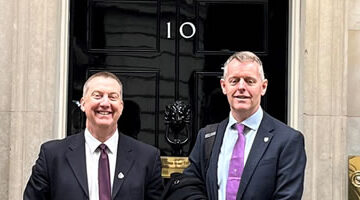President’s Blog June 2015
Writing in the middle of a General Election campaign reminds me of the words of Nils Bohr ‘Prediction is very difficult – especially if it’s about the future’
The campaign to date has focussed heavily on health and in particular NHS funding. The annual deficit forecast by NHS England’s Chief Executive, Simon Stevens is at least £8 billion per annum. We will all have noted that each major party has made a commitment to fund this gap.
I and the College have been noticeably absent from the media spot-light despite many requests for comments, interviews and opinions. This silence is born of prudence as any remark or statement issued during the campaign period is likely to be seized upon to provide alleged support or criticism of one or other party.
The College is politically neutral. Our concerns and aims are not motivated by ideology or political expediency but by our ‘raison d’être” – to raise standards in emergency medicine. We do this by improving the experience and outcomes of our patients and this in turn is dependent upon making EM an attractive and sustainable career.
Nevertheless it is evident that the progress the College has made to date has been the result of building a shared agenda with national organisations, articulating our key points via the media and influencing policy decisions of incumbent governments and administrations. A new parliament is an ideal opportunity to reinvigorate the debate and the College has already embarked upon the challenge of informing all parliamentarians of the key issues.
We have done this by producing the RCEM Factsheet. This document in various formats highlights 26 incontestable facts relating to provision of emergency care in the UK. There are five key areas that we have focussed on; patients, departments, staff, flow and finance. This document has been sent with a covering letter to every MP and many senior leaders and organisations. Each fact is fully referenced to sources of unimpeachable provenance and is stated without comment. Suffice it to say that, taken as a set, the facts need no comment or opinion; they tell a compelling story of a service that is over-stretched, under-resourced and the victim of both the successes of its staff and the inefficiencies of other parts of the health and social care system.
As an example the first 3 facts are:-
- In 2014 there were 14.6 million patient attendances to A&E; 40 patients per minute.
- The UK has the 3rd lowest A&E attendance rate of 12 comparable nations.
- The increase in attendances in 2014 was equivalent to 7 large A&E departments.
This document will act as catalyst for the next round of discussions and debates that we will seek with whichever Government has been elected and act as an ‘agenda’ in much the same way that the RCEM 10 did almost twenty months ago. Those with a keen eye for the policy activities of the College will easily spot the relevance of each of the RCEM Facts to our ongoing STEP campaign.
The other major EM document in circulation is the as yet unfinished ‘Urgent and Emergency Care Review’. This has been ongoing for two years and although mandated only to the NHS in England its influence has extended to some extent to all of the UK and its author has been an invited speaker at relevant meetings in Ireland.
The College has attended and participated in each of the stakeholder events and argued our case consistently but constructively. There have been major areas of agreement particularly around tariff reform and payment mechanisms to acute trusts. We also share a common aim of supporting credible alternatives to emergency departments for patients with non-emergency conditions. It would be wrong to suggest we are in complete agreement. Some of the changes appear to reflect current practice e.g trauma and stroke networks and the review is silent on the subject of fair contracts for EM staff. Nevertheless our input has achieved real progress with the endorsement by the DH, NHS England, Monitor and the TDA of our policies regarding over-crowding, exit block and primary care co-location.
A new parliament will have only a few months before the inevitable media focus on ‘A&E performance’. Our own analysis has shown that during periods of greatest pressure up to 75% of four hour breaches are attributable to Exit Block and remediable only by trust and system wide behaviour seven days per week.
To this end the College has again written to all CEOs highlighting this issue and drawing attention to the RCEMs policy resources for dealing with the challenge. I and the College have no intention of ‘defending’ the failure of others or becoming victims of the flawed analysis of others during the winter of 2015/16.
Finally I would like to record my thanks to the organising committee of our CPD Spring conference, held last month in Belfast. Attended by almost 300 delegates it was a first rate conference. The quality of the formal education was matched only by that of the networking and social events. For those of you unable to travel to Belfast, I hope to see as many as possible in Manchester.
Dr Cliff Mann FRCEM FRCP
President
The Royal College of Emergency Medicine
@RCEMPresident


0 Comments